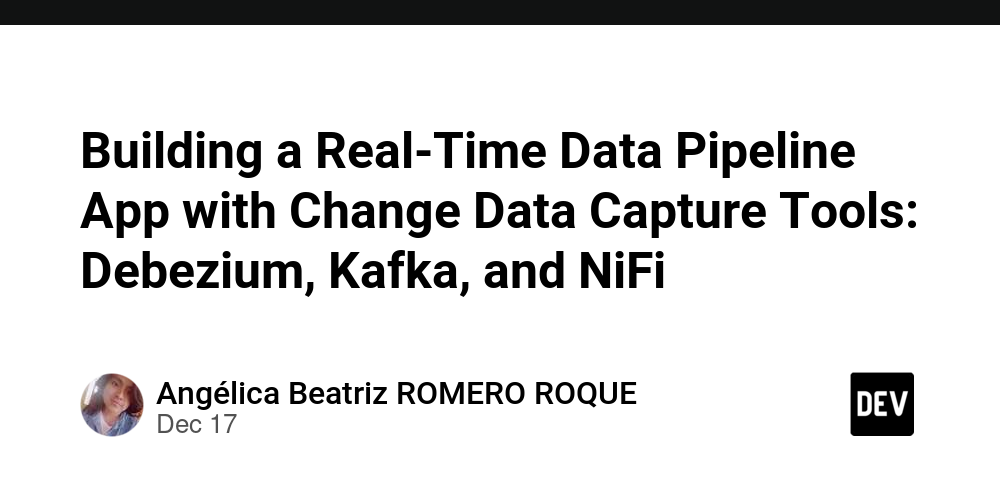Change Data Capture (CDC) has become a key technology for modern data integration, enabling organizations to instantly track and propagate data changes across disparate systems. In this article, we’ll explore how to use powerful open source tools like Debezium, Apache Kafka, and Apache NiFi to build a comprehensive CDC solution
Key technologies in our CDC stack
- Debezium: An open source platform for change data ingestion, supporting multiple database sources.
- Apache Kafka: A decentralized streaming platform that serves as the central nervous system for our data pipelines.
- Apache NiFi: A data flow management tool that helps us route, transform, and process data flows.
Architecture overview
Our proposed architecture follows the following key steps:
- Capturing database changes using Debezium
- Streaming changes via Kafka
- Process and route data with NiFi
- Store or further process converted data
Example implementation method
from confluent_kafka import Consumer, Producer
import json
import debezium
class CDCDataPipeline:
def __init__(self, source_db, kafka_bootstrap_servers):
"""
Initialize CDC pipeline with database source and Kafka configuration
:param source_db: Source database connection details
:param kafka_bootstrap_servers: Kafka broker addresses
"""
self.source_db = source_db
self.kafka_servers = kafka_bootstrap_servers
# Debezium connector configuration
self.debezium_config = {
'connector.class': 'io.debezium.connector.mysql.MySqlConnector',
'tasks.max': '1',
'database.hostname': source_db['host'],
'database.port': source_db['port'],
'database.user': source_db['username'],
'database.password': source_db['password'],
'database.server.name': 'my-source-database',
'database.include.list': source_db['database']
}
def start_capture(self):
"""
Start change data capture process
"""
# Configure Kafka producer for streaming changes
producer = Producer({
'bootstrap.servers': self.kafka_servers,
'client.id': 'cdc-change-producer'
})
# Set up Debezium connector
def handle_record(record):
"""
Process each captured change record
"""
# Transform record and publish to Kafka
change_event = {
'source': record.source(),
'operation': record.operation(),
'data': record.after()
}
producer.produce(
topic="database-changes",
value=json.dumps(change_event)
)
# Start Debezium connector
debezium.start_connector(
config=self.debezium_config,
record_handler=handle_record
)
# Example usage
source_database = {
'host': 'localhost',
'port': 3306,
'username': 'cdc_user',
'password': 'secure_password',
'database': 'customer_db'
}
pipeline = CDCDataPipeline(
source_database,
kafka_bootstrap_servers="localhost:9092"
)
pipeline.start_capture()
Specific implementation steps
- The first step in repository source configuration involves configuring Debezium to connect to the source repository. This requires:
- Appropriate database user permissions
- Internet connection
- Enable binary logging (for MySQL)
- Kafka as a streaming platform Apache Kafka acts as a central message broker, capturing and storing change events. Key considerations include:
- Configure topic partitions
- Set an appropriate retention policy
- Implement one-time processing semantics
- Using NiFi for data conversion Apache NiFi provides powerful data routing and conversion functions:
- Filter and route change events
- Rich application data
- Handle complex conversion logic
Challenges and best practices
- Handling Architecture Change: Implementing a Robust Architecture Evolution Strategy
- Optimize performance: use appropriate partitioning and compression
- Error handling: Implement comprehensive error tracking and retry mechanisms
GitHub repository
I’ve created an example implementation that you can explore and use as a reference. The complete code and additional files can be found at:
GitHub repository: https://github.com/Angelica-R/cdc-data-pipeline
in conclusion
Building a change data capture solution requires careful architectural design and selection of appropriate tools. By leveraging Debezium, Kafka, and NiFi, you can create a powerful, scalable data integration platform that provides instant insights into data changes.
